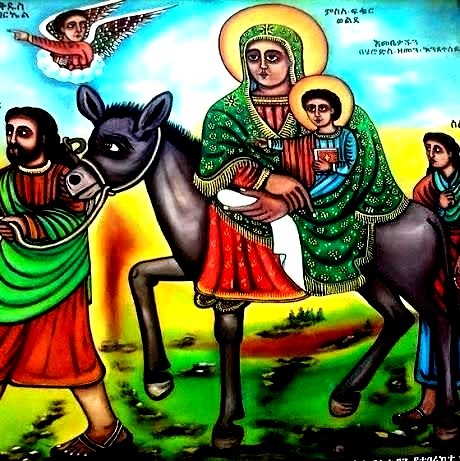Zemene Tsigie: the Season Dedicated to the Flight of the Holy Family into Egypt
October 13, 2016
Kassa Nigus

Zemene Tsigie meaning “the season of flower” is a season devoted to the Flight of the Holy Family into Egypt. The time ranges from Meskerem 26 – Hidar 5 E.C (October 6 –November 14 G.C). It is part of an autumn season that comes after the Ethiopian rainy season in which flowers and fruits appeared,…
a deep blue sky and clean air occur on earth as it is a time of the primary harvest season and abundant fruitfulness.
According to the Ethiopian church tradition, originally, the feast of the Holy Family has been observed from early times in the month of May but latter Ethiopian Church scholars instituted and shifted it to the season of autumn so as to remember and praise St Mary and her Son, Jesus Christ symbolizing by flower and fruit respectively as there is a strong tradition of personification of diverse features of nature in the Ethiopian Orthodox Tewahido Church to illustrate Orthodox teachings and relates them to the lives and day to day activities of the faithful.
During this season of flight, the Ethiopian Orthodox Tewahido Church offers special hymns, the so called Mahilete Tsige (The Hymn of the Flower) and Seqoqawe Dingil (The Lamentation of the Virgin) along with the hymn of St Yared (Digua). These strophes of hymns composed in memory of the hardship of the Holy Family comparing Jesus and His Mother Mary by fruit and flower accompanied with many historical and religious facts as the Prophet Isaiah has compared Jesus by fruit and His Mother Mary by flower as stated: “And there shall come forth a rod out of the stem of Jesse, and a branch shall grow out of his roots.” (Isaiah 11:1).
The flight into Egypt has a biblical base as stated in the Gospel of Matthew: “And when they were departed, behold, the angel of the Lord appeared to Joseph in a dream, saying, arise, and take the young child and his mother, and flee into Egypt, and be thou there until I bring you word: for Herod will seek the young child to destroy him.” (Matthew 2:13-23). Joseph fled to Egypt with St. Mary and infant Son Jesus after a visit by Magi because they informed that King Herod intends to kill the infants of that area. When the Magi came in search of Jesus, they went to Herod the Great in Jerusalem and asked where to find the newborn "King of the Jews". Herod became paranoid that the child will threaten his throne, and sought to kill him (Matthew 2:1-8). Herod ordered the Massacre of the Innocents in hope of killing the child (Matthew 2:16-18). But an angel appeared to Joseph and told Joseph to take Jesus and his mother into Egypt (Matthew 2:13).
During this time, the Ethiopian faithful devotes in praying, fasting and other generous activities in memory of the flight of the Holy Family and their hardship in the wilderness of Egypt. The fasting is performed on one’s free will for it is out of the seven official fasting periods for abundant blessings one expects from God through the intercession of St. Mary.
On Sundays and other holidays, the clergy, often joined by a large number of people, gather the whole night for the divine office and sung up to the time of Mass. After the conclusion of the Divine Liturgy, the believers especially in rural areas prepared a banquet (wine and food) in every Sundays of Zemene Tsigie in the name of St Mary and celebrate the season in such charitable activities.
